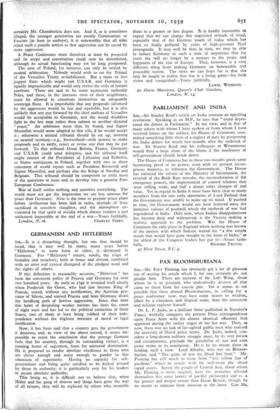PARLIAMENT AND INDIA Sta,—Sir Stanley Reed's article on India contains
an appalling revelation. Speaking as an M.P., he says that " many depre- cated the debate in Parliament." In my view, and in that of many others with whom I have spoken or from whom I have received letters on the subject, the House of Commons com- mitted something little short of a neglect of duty by postponing the India debate for nearly two months after the outbreak of war. Sir Stanley Reed and his colleagues at Westminster would bear a large share of the blame if the machinery of self-government should break down.
The House of Commons has in these two months given some heartening proof of its power, even with its present incon- gruous majority, to influence the Government. The House has enforced the reform of the Ministry of Information, the reversal of the Bank Rate mistake, the reconsideration of the emergency powers, the improvement of control schemes that were stifling trade, and half a dozen other changes of real value. Yet in regard to India it must have been clear to many members from the two early statements of Lord Zetland that the Government was unable to make up its mind. If pushed in time, the Government would not have frittered away the immense volume of goodwill which the outbreak of war had engendered in India. Only now, when Indian disappointment has become deep and widespread, is the Viceroy making a realistic approach to the problem. Was the House of Commons the only place in England where nothing was known of the anxiety with which Indians waited for "a few simple words that would have gone straight to the heart of India," as the ablest of the Congress leaders has put it?—Yours faith-




































 Previous page
Previous page